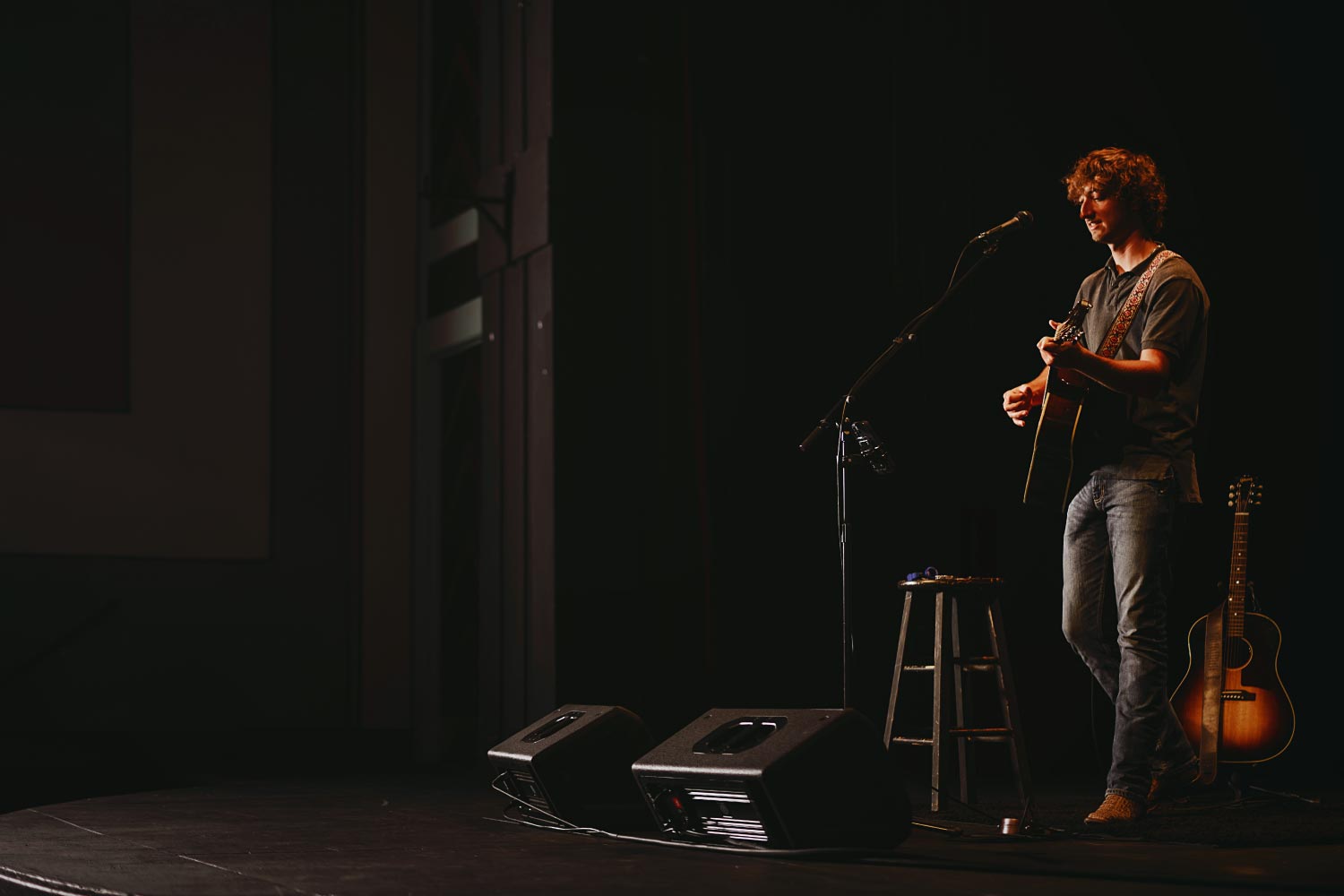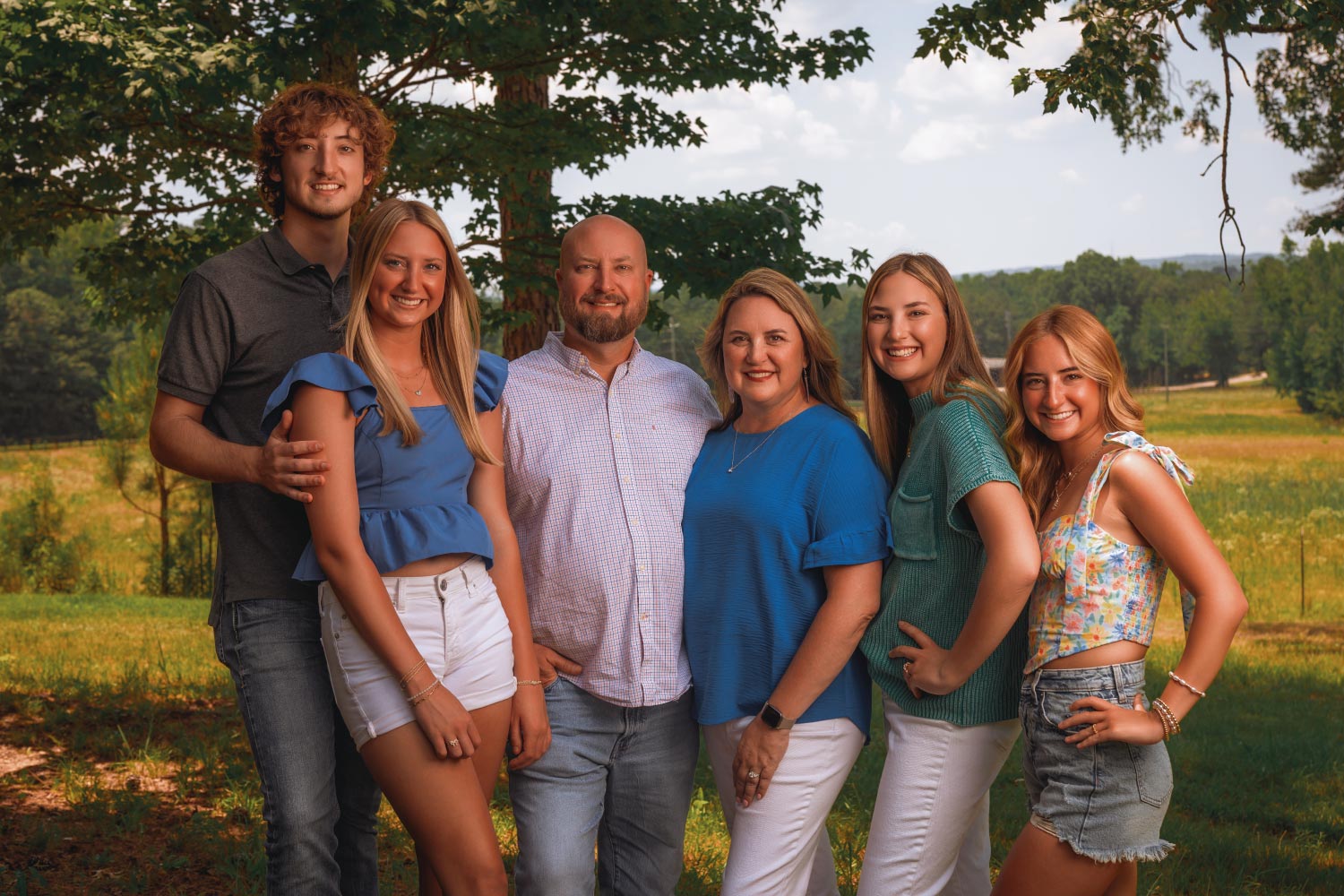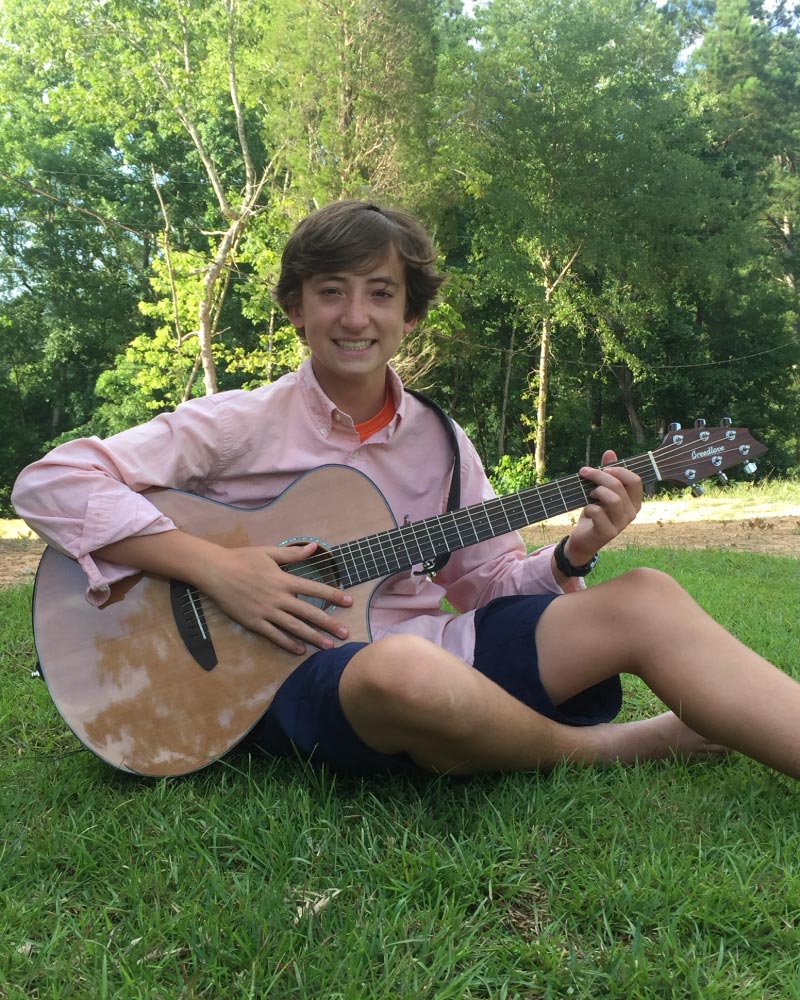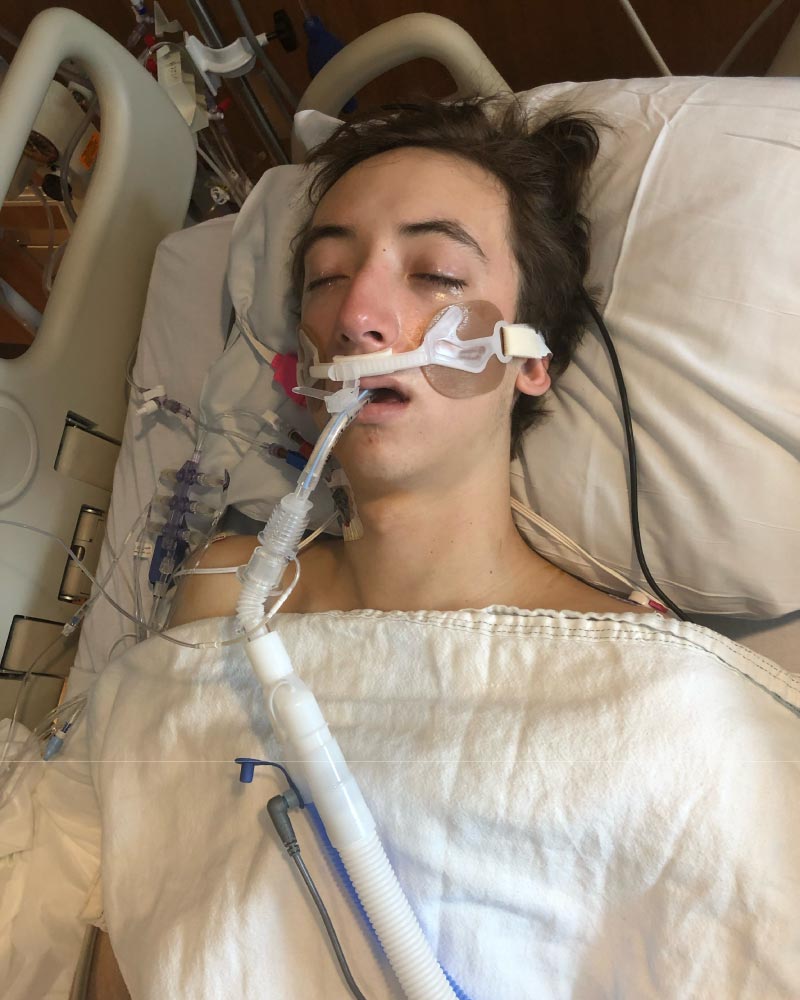Berritt | Living with Hypertrophic Cardiomyopathy
Pell City, Alabama | Born April 2002
People are really strong. You don’t know it until you get their story and understand what they’ve been through.
Outside the Ritz Theater in Talladega a queue starts to form under the distinct art deco façade. Berritt steers his white pickup truck into a parking spot and emerges wearing sunglasses and a hat, smiling to greet his friends and fans who have come to this historic venue to see him perform on a sweltering Alabama summer evening.
After some hardy hellos, he grabs a guitar case in each hand and enters the air-conditioned theater, heading straight to the stage for soundcheck. His fiancé, Morgan, hauls in a large plastic tote and dutifully begins laying out a merchandise table in the entranceway.
Rouge carpet lines the floors and matches the rows of seats and work lights flood the black stage.
Berritt is no stranger to being in the spotlight and all the nerves that come with it. As the crowd enters, he shrugs off any pre-show jitters by chatting with his friends and family who’ve come to see him play. In the front row sit his parents, Monica and Jeremy, and three sisters, Ryleigh, EllaGrace, and Kynlee. They are a team, supporting Berritt and his dreams with music.
When the lights dim, Berritt walks out onto stage.

“Hello everyone. I’m Berritt Haynes. Most of you know that already.” His stage demeanor is laid back, but once he launches into his first song, Berrit takes on another air. As he sings, small beads of sweat dot his forehead. It’s clear that Berrit’s music—a budding career—comes with strong messages of passion, faith, and battling heart disease.
“If you’ve never heard of my disease before, it’s called HCM,” Berritt explains to the audience. “I was diagnosed when I was eight, had an internal defibrillator placed when I was 14, and open-heart surgery at 17.” HCM or hypertrophic cardiomyopathy is a genetic heart disease. It forever changed Berritt’s path through life and his experiences with the disease are now deeply ingrained in his music. And as that career takes off, bolstered by his spot on The Voice, the reality TV show, in 2021, his HCM is being featured more prominently.
Berritt’s first original of the night, Guide My Way, unfolds into a ballad of sorts—an acapella bridge emotionally recounts the intimate shock that came with his diagnosis. “I remember being really mad. I wanted to scream,” Berritt says later, offstage. Channeling these memories became the basis for the song, and furthered his desire to write. “Expressing my emotions through music—that’s the hardest thing to do,” Berritt acknowledges. “Once you unlock that, that’s how I figure out where I need to go.”
“Every beat of my heart a reminder of pain, Searching for the strength to break these chains. Though anger and sadness have clouded my sight With each passing day, I’ve tried to be strong And fill this hole I’ve been digging on.”
From “Guide My Way”

The Haynes had never heard of HCM before Berritt’s diagnosis and there is no family history of the disease. As Monica and Jeremy’s oldest and only son, Berritt grew up as many boys in Alabama do: playing team sports. However, at eight years old, a heart murmur was discovered during a routine checkup, leading to a pediatric cardiologist eventually identifying the early signs of HCM in his heart. Learning how the disease thickens the cardiac muscle frightened the family, knowing that Berritt was at risk of adverse cardiac events if he was to overexert himself.
Subsequent genetic tests confirmed that Berritt’s HCM was due to a mutation of the myosin-binding protein 3, (MYBPC3) which, it was later revealed, he inherited from Monica, who has experienced some heart-muscle thickening as well. Subsequent genetic tests of Berritt’s siblings revealed that his youngest sister, Kynlee, then only a toddler, was also born with the genetic marker for the disease.“I had a lot of mommy guilt,” she recalls. “We had four kids and I gave it to two of them.” Being a nurse, Monica rapidly educated herself and began taking proactive steps to find alternative activities for her son. Her expertise has been a defining force in Berritt’s journey.
The Haynes are a devout family, and their religious conviction has played no small role in their perspective on HCM and the way they chose to accept it. “God’s plans are not ours,” reflects Jeremy. “We were just fortunate to have the right people in our life.” His faith helped him make sense of the diagnosis, and adapt his mindset to better support his son. It was through his and Monica’s church community that strong bonds formed to support Berritt.
 “I’ve been singing my whole life,” says Berrit. Before he could walk or speak he was learning hymns in church—his great aunt was choir director. “We would pass Berritt from lap to lap during choir practice,” recalls Monica. “We knew he had a love for music.” After his diagnosis, Monica and Jeremy bought Berritt a guitar and his grandpa, Roger, helped pay for lessons. He continued to sing in the church choir and joined the concert and marching band at school. During his teenage years, he began practicing more and more, learning songs by his favorite artists: Jeremy Camp, Chris Stapleton, and Luke Combs just to name a few.
“I’ve been singing my whole life,” says Berrit. Before he could walk or speak he was learning hymns in church—his great aunt was choir director. “We would pass Berritt from lap to lap during choir practice,” recalls Monica. “We knew he had a love for music.” After his diagnosis, Monica and Jeremy bought Berritt a guitar and his grandpa, Roger, helped pay for lessons. He continued to sing in the church choir and joined the concert and marching band at school. During his teenage years, he began practicing more and more, learning songs by his favorite artists: Jeremy Camp, Chris Stapleton, and Luke Combs just to name a few.
Not long after diagnosis, Monica’s brother, Chris, suggested Berritt attend a marksmanship program and he got involved at the local 4H club where he learned hunting, fishing, and outdoor skills. These became Berritt’s most beloved outdoor activities. Hunting and fishing allowed Berritt to bond with his step-grandfather, Richard. Rising early, gearing up, and spending the day out in the woods or on the lake was something he grew to love. Berritt became a skilled deer hunter, and the two would convene regularly each winter to stalk bucks.
When Berritt was 14, Richard first suggested the idea of trying a climbing tree stand for deer hunting. “At such a young age, I didn’t think it would be bad,” remembers Berritt. “I wasn’t really thinking about my heart at that point either.”

On a cold November morning, he donned hunting camo, warm hat, gloves, and with a rifle headed out to the woods with Richard by his side. The two found trees within sight of each other and Berritt set up his stand. He tied a safety strap around his waist and hooked his feet into the holsters. By lifting his feet he raised the platform a few inches at a time, along with himself and all his gear, starting the long slow climb up the trunk of a pine tree until he was close to twenty feet from the ground.
The amount of physical exertion was too much for Berritt’s heart and he was overtaken by the urge to pass out. He yelled out to Richard, who turned to see Berritt slumped over in his tree stand and harness. Richard rushed to descend from his own tree stand to help him.
Ten seconds later Berritt awoke in a sweaty haze. He saw Richard scuttling down his tree. The hot flashes were overwhelming and he began ripping off winter clothing to cool himself down.
Fortunately for Berritt that day, the episode ended without further incident. He was able to lower himself down the tree and safely reach the ground on his own. However, at the cardiologist he learned that things could have ended up worse—much worse—and for the first time, the reality of HCM came crashing down on him. “[The cardiologist] showed me what could potentially happen. He showed me that my heart was getting worse.” His heart muscle was thickening which was hampering its ability to pump blood. A defibrillator would be the best line of defense if an arrhythmia were to occur, and could restart his heart during a sudden cardiac arrest. It was time for Berritt to get an ICD.
“When he had his first surgery, that’s when I really learned about the heart disease,” says EllaGrace. “That’s when I was like, this is serious.” Berritt was astounded by the pain when he awoke with an ICD under this left pectoral muscle. “It really humbled me,” says Berritt. “It was real painful.” Getting an ICD placed was a major turning point—Berritt gained a truer understanding of what was on the line.
In his teenage years, Berritt’s heart continued to thicken which started to affect the valves. His parents understood that he would need open-heart surgery eventually, but hoped against hope that he could finish up his schooling first. “We just wanted to get him through high school before he got surgery,” recalls Monica. However, their cardiologist advised them to act sooner.
Berritt requested to get the surgery after his junior prom. However, things were put on hold again when the Haynes learned that Jeremy’s father, Roger, had advanced pancreatic cancer. His time was short.
“My grandfather passed four days before my open-heart surgery,” says Berritt. “He was my best friend. We did everything together.” He worked as a long-haul trucker, and Berritt fondly recalls many journeys across the southern US, sleeping in the cab of his truck. “He fought stage IV pancreatic cancer for a year-and-a-half and the doctors told him he wouldn’t live six months,” Berritt continues. “People are really strong. You don’t know it until you get their story and understand what they’ve been through. I have a lot of respect for people who have had open-heart surgery or have had stage IV cancer.” Berritt sang at his grandfather’s funeral and then prepared himself to go in for surgery.
 With loss behind him and uncertainty ahead, Berritt went under for a septal myectomy, a surgery aimed at reducing the size of the cardiac muscle on the septal wall and reducing ventricular obstruction. Myectomy can offer patients relief from HCM complications, but the procedure can be risky, with a 4% mortality rate.1 His family was by his side throughout the whole ordeal, sitting in the waiting room. “I remember praying together,” says Ryleigh. “We all had to stand around his bed, thinking, “We’re really about to do this? This is really scary.”
With loss behind him and uncertainty ahead, Berritt went under for a septal myectomy, a surgery aimed at reducing the size of the cardiac muscle on the septal wall and reducing ventricular obstruction. Myectomy can offer patients relief from HCM complications, but the procedure can be risky, with a 4% mortality rate.1 His family was by his side throughout the whole ordeal, sitting in the waiting room. “I remember praying together,” says Ryleigh. “We all had to stand around his bed, thinking, “We’re really about to do this? This is really scary.”
Berritt’s surgery went smoothly, until it didn’t. “The surgeons told us he was off bypass and I breathed a sigh of relief,” remembers Monica. However, she learned shortly thereafter that he was being put back on. “That’s strange,” she thought. It turns out, his aortic valve had torn and the surgeons needed to work fast to repair it. In the ensuing moments Berritt’s heart stopped and the team quickly used a defibrillator to shock his heart twice until it started beating again.
Berritt awoke in a level of pain and discomfort he had never experienced before in his life. “The most frightening part of that situation was waking up with a tube down my throat,” he remembers. “I had wires coming out of me everywhere.” He would suffer a collapsed lung in recovery and again had to have emergency intervention. However, he amazed everyone by recovering from the surgery relatively quickly. “Kids are so resilient,” says Monica. “Berritt had surgery on a Thursday and came home on Sunday, four days later.”
On the following day he picked up his guitar and a week later was back singing on the praise team for church. Monica’s intuition told her that his gift for music was larger than he might even know. As Berritt finished his senior year of high school, he began to perform more regularly, for friends and eventually at local bars and clubs. It was Monica’s idea to send a video of Berritt singing to the show The Voice in 2021. However, on a spring day watching a movie with his family, he got a voicemail. It was a call-back from The Voice.
After numerous follow-up interviews and videos, Berritt traveled to California to be on the show. At 19 years old, it was his first trip alone across the United States and he loved it. The exposure of being on national television was a one-of-a-kind experience and opportunity.
Despite his hopes and best efforts, very little of Berritt’s story with HCM made it onto The Voice. “I told my story every chance I got,” he says. “They just didn’t show much of it.” However, being on the show did help his music career. It helped him land a monthly gig in Nashville and continue to make the connections needed to get better and better gigs. He makes it clear though, no matter if fame or fortune comes his way, his passion is for music. “If I got famous, it wouldn’t change my day-to-day.”
This is because, ultimately Berritt is a young man whose principles are strong and whose heart condition has only reinforced his gratitude for what he has and what he does. “My mom and dad have been really supportive of everything I’ve done,” he says. “They’ve been there every step of the way to support me with my diagnosis, my surgeries. We’re a big family and we love to be together.”
“I see him making it big, and sharing his story, and helping others,” says Kynlee. As the youngest sibling, and another child with the same genetic mutation as Berritt, she looks up to her older brother in multiple ways. Luckily, her heart has not declined in a way similar to Berritt’s. She runs track and is on the school dance team. With a cautious eye, Monica closely monitors her activities, waiting for any sign of HCM to show, while taking a proactive approach in her community. She and Jeremy have succeeded in getting defibrillators installed across their local school district in rural Alabama.
“My three younger sisters. They’re something else,” says Berritt. “Ryleigh has epilepsy. She’s struggled with that for the past couple years. I really think me and her have gotten closer because of that. We can kind of relate to each other on that aspect.” She too has experienced limitations from her condition, and can commiserate with her big brother. “Berritt is a great big brother,” she says. “If I ever need anything, I can just give him a call.”

Back at the Ritz theater in Talladega, Berritt belts out his final notes and wishes his fans a good night. He carefully packs up his guitar and walks over to Morgan, waiting in the wing. They embrace and soft, sweet Berritt comes out, relieved to be done and to finally step off the stage. Morgan is his rock. The young couple look ahead toward planning their lives together—perhaps a tiny home, or cabin—and approach their future with modesty and sincerity.
As Berritt transitions into adulthood there are few certainties. The surgery helped his heart health, but with HCM, the long-term risk of heart failure, and the need for a transplant loom on the horizon. Berritt and his family face these truths while building support and community through organizations like the HCMA, which has helped Berritt meet researchers and physicians specializing in HCM. Whether through his music, educating about heart conditions in the local school system, or working with organizations dedicated to addressing the root cause of HCM, Berritt and his family have heard the gospel and live their lives to spread it.
“For I know the plans I have for you,” declares the LORD, “plans to prosper you and not to harm you, plans to give you hope and a future.” – Jeremiah 29:11
